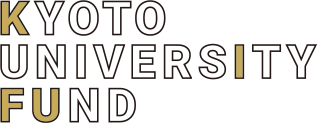Vol.7 Messages from graduates
Messages from graduates: Special Event on the 11th Kyoto University Homecoming Day
Take a Fresh Look at Ways of Working and
Carve Your Future Career Path
On November 5, 2016, that year's Homecoming Day, an event titled "Considering the Careers of Kyoto University Students" was held, following the previous year's event, to provide an opportunity for interaction between alumni and current students.
The event comprised lectures and a panel discussion featuring Kyoto University alumni with diverse careers. The guest speakers delivered messages based on their experiences of carving their own career paths by demonstrating their individualities, with the hope that students and young alumni who attended the event would derive from their messages a new perspective on their own future and current work.
Part 1: Lecture
Consider Ways of Working
Nowadays, after the shift from the factory-led economy model to the tertiary-industry-centered economy model, what new ways of working are required? What should students learn to conform with? Lifenet Insurance Company Chairman Haruaki Deguchi, who founded a company that sells insurance via the Internet after he reached 60, shared his views on the importance of "people, books, and travel."
Mr. Haruaki Deguchi
Representative Director and Chairman,Lifenet Insurance Company
Mr. Deguchi joined Nippon Life Insurance Company in 1972. He was engaged in corporate business planning in the Corporate Planning Department and Financial Planning Department and served as the first chairman of the Expert Committee for Financial Planning of the Life Insurance Association of Japan, and worked to revise the financial system and the Insurance Business Act. He also served as president of Nippon Life's subsidiary in London and general manager of the International Operation Department before retiring from the company. In 2006, he founded a preparatory company for life insurance and became its representative director and president. After obtaining a license to conduct life insurance business in 2008, the company, Lifenet Insurance Company, began operations. He assumed his current position in June 2013.
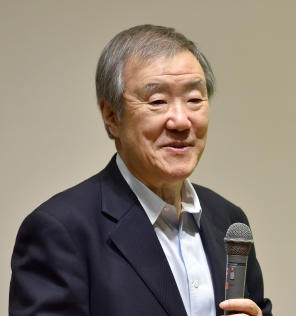
What labor reforms are necessary in Japan,
where tertiary industry leads the economy
Since all people have a certain level of motivation for self-improvement, no one is working with 100% satisfaction with the world around them. Everyone is unsatisfied to some extent but cannot change everything solely by themselves.
Then, how do you recognize the world you live in now, what do you dislike in that world, and what do you want to change? What should you do to change the world in your current position? The meaning of human life and work lie in the endless pursuit of answers to these questions and continued efforts to put the answers into practice.
So, what situation does Japan currently find itself in? The severest problem we face now may be the aging population due to the declining birthrate. The government has adopted economic measures called the "three arrows," with the aim of raising the birthrate back to 1.8, ensuring that no care workers will quit their jobs, and increasing the nominal GDP to 600 trillion yen. All these goals are related to our ways of working.
Let's focus our attention on the third goal now. Achieving a "strong economy" with a 600-trillion-yen GDP requires increasing labor productivity.
Except for part-time workers and the like, each average Japanese worker works 2,000 hours per year. This figure has hardly changed for the past 25 years, but we should pay attention to the fact that Japan's GDP grew annually by only about 0.5% between 2013 and 2015.
Meanwhile, although each average French or German worker works about 1,400 hours per year, the GDPs of these two countries grew by over 1.5% during the same three-year period. Our fundamental problem is our failure to increase productivity despite long working hours.
Suppose that there are two editors, A and B, working at a publishing company. While editor A works from 8 a.m. to 10 p.m. but cannot create books that sell well, editor B works from 10 a.m. to 6 p.m. and often creates best-sellers.
If you were the president of the publishing company, you would naturally rate editor B more highly than editor A. Then, how would a factory owner rate the two workers? There is a difference between how the factory-led economy model and the tertiary-industry-centered economy model rates such workers. In the factory-led economy model, longer working hours mean higher productivity. However, in the tertiary-industry-centered economy model, working hours do not lead directly to productivity because tertiary industry is a world where imagination and ideas count.
Working in such a tertiary-industry-centered society requires you to increase your power of imagination, or your ability to develop original ideas. I believe that the only way of increasing your power of imagination is to study, by which I mean encountering people, reading books, and traveling.
A survey shows that about half of startup managers in the U.S. are from outside the U.S. Encounters between talented people from different fields inspire those people with original ideas. I recommend that you as students encounter diverse people, read various books, and travel widely to broaden your knowledge and experience. That will help you in your future work.
Young people should acquire
the true ability to think now
To put it in the extreme, I would affirm that work does not matter so much. If you wrongly identify your work with your life, you will be unable to work boldly. Since your work accounts for only 30% of your entire day, you must remember that your family and friends are more important for you.
Everyone hopes to live a happy, fulfilling life. The only way to achieve this is to increase your labor productivity and continue voting for good leaders.
In conclusion, I would like to advise you as young people to place a high value on increasing your ability to think. As an effective method of doing so, I would recommend reading classics while reliving the authors' thinking processes.
I emphasize the ability to think because, if people who can adapt to changes survive in this everchanging world, you must be able to construct logic based on data and facts available at times and think on your own whatever occurs. If you can do so, it means you are adaptable. I will give you some words a physicist once said: "Study only to think on your own and express yourself in your own words."
Part 2: Panel discussion
For Your Future Career
Part 2 was dedicated to a panel discussion facilitated by Associate Professor Takayuki Shiose of Kyoto University Museum, with four Kyoto University alumni as panelists. The speakers, with different career experiences including changing jobs and starting up businesses, looked back at the paths they had followed and gave some helpful advice on young people's future careers, such as: "If you are wavering on whether to do something, you should do it" and "You should take up difficult challenges while you are young."

●Facilitator●
Dr. Takayuki Shiose
Associate Professor, Kyoto University Museum
Dr. Shiose graduated from the Faculty of Engineering, Kyoto University in 1996 and completed the Master's Program at the Graduate School of Engineering, Kyoto University in 1998. He received a PhD in Engineering from the University. He worked as an associate professor at the Kyoto University Museum and assistant division manager in charge of science and technology policy at the Industrial Science and Technology Policy Division, Industrial Science and Technology Policy and Environment Bureau, Ministry of Economy, Trade and Industry, before returning to his previous position (in charge of the history of technology) at the University. He also serves as an expert member of the Special Team for Exploratory Subjects over High School Mathematics and Science in the Primary and Secondary Education Subcommittee, Central Council for Education, and as a member of the Education Creation Conference for the Gifu City Board of Education.
●Panelist●
Mr. Katsunori Furuichi
President and Managing Director, K.K. Box Japan
Mr. Furuichi graduated from the Faculty of Economics, Kyoto University in 1985 and joined Nippon Telegraph and Telephone Corporation (NTT). He worked as a partner at PRTM Management Consulting (currently PwC Consulting) and as president of VeriSign Japan (currently Symantec) before assuming his current position in August 2013. He leads Box's growth in the Asia-Pacific region. He earned an MBA from London Business School.
●Panelist●
Ms. Hiromi Watase
Director, Maxvalu Nishinihon Co., Ltd.
Ms. Watase graduated from the Faculty of Agriculture, Kyoto University in 1988 and joined Recruit Co., Ltd., where she established Zexy, a popular Japanese bridal magazine. She founded a consulting company specializing in business strategies and new business, established a venture capital firm, and served as a representative director of a listed company. She is currently engaged in managing multiple companies, mainly listed ones.
●Panelist●
Mr. Tomotaka Takahashi
President, Robot Garage Co., Ltd.
Mr. Takahashi founded Robot Garage at the same time as he graduated from the Undergraduate School of Engineering Science, Faculty of Engineering, Kyoto University in 2003. His company was the first startup to be housed at Kyoto University. His representative works include the robot phone RoBoHon, the robot astronaut Kirobo, the weekly DeAGOSTINI magazine Robi, the Evolta robot, which successfully climbed to the top of the Grand Canyon. He also serves as a project associate professor at the Research Center for Advanced Science and Technology, The University of Tokyo, and as a visiting professor at Osaka Electro-Communication University.
●Panelist●
Mr. Yoshiyuki Fujishiro
President and CEO, Rorze Corporation
Mr. Fujishiro graduated from the Undergraduate School of Informatics and Mathematical Science, Faculty of Engineering, Kyoto University in 2003 and completed the Master's Program at the Graduate School of Informatics, Kyoto University in 2006. He joined Media Max Japan LLC (currently Media Max Japan Inc.) in 2005. After joining Rorze in 2006, he served as general manager of the Software Solution Department and as a senior managing director before assuming his current position in May 2015.
Shiose Since you have various career experiences, including changing jobs and starting up businesses, I would like to ask you about your "rock bottoms" and "career highs." I understand that Mr. Furuichi's rock bottom came after leaving NTT and starting a new job . . .
Furuichi My encounter with corporate presidents at similar ages to me at London Business School inspired me to take up new challenges as early as possible. That was why I moved to a foreign affiliated company, but the worse its business results grew, the more tightly the parent company squeezed us, so I became unable to decide anything for myself.
Shiose After that, you further changed jobs several times before reaching your career high where you are now. What special methods have you used or what efforts have you made to reach your current position?
Furuichi Every time I wavered on whether or not to do something, I chose to do it. Even if you find your attempt has failed, you can understand why you have failed and use this understanding for your next attempt.
Shiose Ms. Watase has defined her rock bottom to date as her experience in trying to establish a bridal business and having her projects scrapped many times, and her career high to date as her success in publishing a new information magazine.
Watase Before that, proposals on publishing a bridal magazine had been rejected on the basis of the small size of the market. But our market surveys and interviews with people in the bridal industry revealed both major structural problems and demand for such magazines in the industry. I was deeply impressed when our persistent efforts to win new-business competitions despite repeated failures resulted in the publication of the magazine.
Shiose Mr. Takahashi has defined his rock bottom to date as his failure in an employment examination, and his career high as coming tomorrow or later.
Takahashi I hope to be better today than yesterday and be better tomorrow than today. I was a student when it was difficult to find jobs after the collapse of the bubble economy. Although I wanted to join a manufacturer of fishing and skiing equipment, both of which were my hobbies, I was not employed by the company. I talked about this on various occasions, so the company gave me a phone call some years ago.
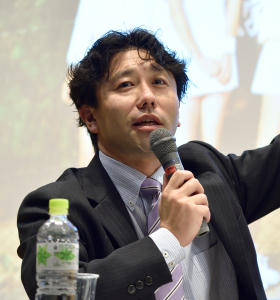
Shiose So that's how you became an outside director of the company. It's a very interesting career experience. Mr. Fujishiro has defined his rock bottom as his days before employment, and his career high as the past year.
Fujishiro Since I began to work at a startup founded by Kyoto University students when I was an undergraduate student, I did the same job for about seven years. That process made me realize that my growth curve gradually turned downward, and I felt frustrated with it.
Shiose After that, you found a job at a semiconductor manufacturer.
Fujishiro That's the company my father-in-law managed, so I suddenly found myself on a path someone else had carved. However, I have always kept in mind that you should take up challenges while you are young. For example, second-year elementary school students learn multiplication tables at school. Preschoolers who memorize the table will be called geniuses, and second-year elementary school students who do so will be called ordinary children, while third-year elementary school students who do so will be viewed as being behind other children. This means that taking up difficult challenges when you are as young as possible will lead you to be highly rated. Therefore, I'm always careful not to miss opportunities.
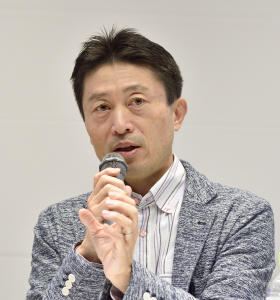
Advice for "myself during my student days" and current students
Shiose From your career experiences, what advice would you give to yourself during your student days and to current students?
Furuichi Because I have wandered around since I dared to leave a major company, I would not recommend my career path to my children. Such a career crucially depends on luck.
I would like to emphasize that you should not continue to strive for the very limits of what you can do. I certainly believe that, once you become a member of an organization, you should not easily escape your responsibilities, but you may choose to withdraw temporarily. You should take up new challenges, with withdrawal being kept as one of the choices available to you.
Watase When I joined Recruit, the company was just a half-fledged startup, but I thought that it would be interesting as I couldn't imagine what I would be doing in 10 years' time. If you can easily imagine what you will be doing in the future, your days at work will be a kind of throwaway game. If you are at a crossroads, I would recommend choosing a path that cannot be easily imagined.
In addition, be reckless while you are young, so you can be trusted by people around you and a slightly higher stage will be offered to you. If you make further efforts there, the next stage will appear in front of you, and challenging yourself to work on more and more difficult stages will help strengthen you.
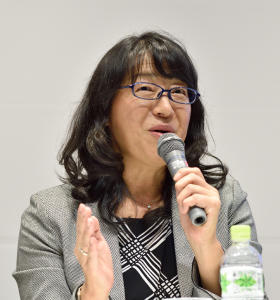
Shiose Mr. Takahashi, you have consistently worked on robots since your student days.
Takahashi I began to develop robots when I was a student because I expected that making myself famous for robots from the beginning would enable me to do the work I like even after joining a company. I launched this activity in anticipation of being employed, but I ended up establishing a startup without being employed.
Concerning today's theme, "ways of working," I myself don't believe that all students should be employed. While you have to wait for your turn once you join an organization, you can jump the line if you don't belong to any organization.
Fujishiro In 2009, I was appointed as general manager of a new department, and after a while, I was unofficially offered the job of president of a U.S. subsidiary. I felt I could not afford to accept the offer at that time, so I refused. Although I had hoped to react to a good opportunity reflexively rather than as a result of thorough consideration, I excessively considered all the various factors involved on that occasion and ended up refusing the offer. I still regret that. I would advise myself at that time to make a choice more positively and more aggressively.
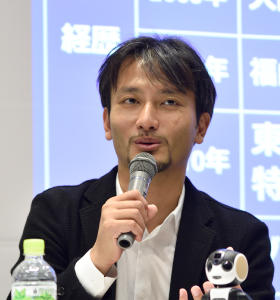
What you should do now for what you will be in the future
Shiose In conclusion, can you give young people a message on ways of working or what they should do now?
Furuichi While Alumni Association Chairman Deguchi mentioned "people, books, and travel," I believe that you should continue studying even after you begin to work. The way of studying that I found effective was listening to lectures. Since I made it a rule to ask questions after a lecture, I was able to train myself to develop appropriate questions and speak in public, and I sometimes succeeded in building a relationship with the lecturer. I hope that young people also actively go to listen to lectures.
Watase I have recently realized that my work serves society. I believe this is because I have taken up difficult challenges and increased my own strengths. Although I cannot guarantee that this attitude will lead you to success, it will surely enable you to achieve self-development, and the accumulation of such self-development is a shortcut to success.
Takahashi The only way to create "innovation," which has recently been called for everywhere, is to do something different from other people. Even Kyoto University students include only a very small number of potential innovation creators. If such talented people are buried in oblivion as members of an organization and cannot demonstrate their abilities, it will be a waste of their talents. I hope that, even if people around you are opposed to your intentions, you will still devote an all-out effort to what you like or where your strength lies. I also hope that people with both high ability and boldness will become innovators.
Fujishiro I hope that you will continue upgrading yourself while boldly believing that you should not stop your process of self-development and that the emergence of new rivals will make you happy.
Shiose The network between Kyoto University alumni has enabled you to listen to such valuable talks at this event. I hope that the young people here will model themselves after the guest speakers with remarkable careers and achieve such outstanding self-development that they can afford to make donations to their alma mater one day.
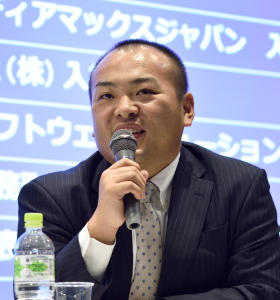

Following the panel discussion, Professor Shin Nishiyama, Kyoto University Archives, delivered a special lecture titled "Kyoto University at Those Times--In the 1970s and 1980s--. When various images of the campus in those days, including the appearance of buildings and scenes from class activities, were shown, the audience, which included a wide range of age groups, looked back at Kyoto University from those times in different ways, with some of them expressing nostalgia, and others carefully viewing the images out of curiosity.
At the social gathering that followed, alumni and current students had friendly interactions with each other and with the lecturers and panelists. The gathering also included a program where alumni showed photos taken when they had been students or shared their memories with other attendees. After the gathering, the attendees made comments such as, "This event provided me with a good opportunity to build up relationships with my seniors and made me feel proud to be a Kyoto University student," and "I have recognized anew the importance of taking up challenges while being young." The event ended with remarks by Kyoto University Vice President Yoshihiro Tokuga in charge of the University Funds, who said, "We hope to continue providing opportunities for interactions between alumni and current students while exploring what kinds of collaboration between alumni are suitable for Kyoto University."
Professor Nishiyama (left) in friendly conversation with a lecturer and a panelist (center and right)
(Event held in November 2016)

